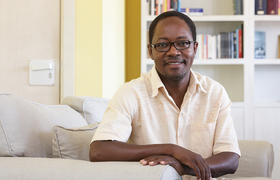SA’s magistracy under the spotlight
28 July 2020 | Story Niémah Davids. Photo Piqsels. Read time 7 min.
High volumes of work, rapidly rising stress levels and a constant fear for their safety are some of the concerns that South African magistrates highlighted during a research survey facilitated by the Democratic Governance & Rights Unit (DGRU) at the University of Cape Town (UCT).
Based at UCT’s Faculty of Law, the DGRU is a research and advocacy unit that focuses on supporting judicial governance and providing free access to legal resources in Africa. The unit is one of the continent’s leading research centres in the area of judicial governance.
The South African Magistrates’ Survey was commissioned to understand magistrates’ perceptions of their individual roles and highlights the key interrelated challenges they face. The survey set out to determine magistrates’ workloads and support structures, as well as the reasons for their high levels of stress and anxiety.
“Given the importance of the magistracy in providing access to justice … it was important to understand how they view this role.”
The South African Magistrates’ Survey is the first of a series of research surveys conducted in South Africa, Malawi and Namibia on the state of the judiciary. The DGRU surveyed 156 magistrates for the first analysis.
“Given the importance of the magistracy in providing access to justice, as well as their increasing role as a pool of potential judges of the high court, it was important to understand how they view this role,” said Vanja Karth, director of the DGRU.
High volumes of work
Concerningly, Karth said that 50% of magistrates surveyed indicated that their workloads are far too high.
“If justice requires, among other things, time for judicial officers to deliberate on [a] case in front of them, the survey suggests that too many magistrates perceive that they don’t have sufficient time to do so,” she said.
Magistrates who deal exclusively with civil cases, which amounted to roughly six out of 10 respondents, indicated that their workload was “unmanageable”.
“It may be that the lack of training is hampering magistrates’ ability to work effectively.”
Karth said researchers can only speculate why this is so.
“Prosecutors’ experiences [are] in criminal law, which means their training is primarily in criminal law. Only when they are appointed as magistrates do they receive training in civil law. It may be that a lack of training is hampering magistrates’ ability to work effectively,” she said.
In a follow-up focus group discussion, magistrates explained that recent changes to laws such as the Children’s Act and the introduction of the National Credit Act have created additional workloads. This largely goes unrecorded as court hours since it predominantly involves mediation and discussion that take place in the magistrates’ chambers rather than in open court.
Approximately 48% indicated that the workload was manageable, while 2% of respondents said they do not have enough work.
Safety concerns
Alarmingly, more than half of the respondents fear for their safety – in and outside of court.
Roughly 44% of magistrates said they have been personally harmed as a direct result of their judicial role (40% men and 50% women). About 55% of magistrates in the Western Cape and 64% of magistrates in Limpopo have been threatened in the past.
Karth said geographical location plays a large role in this process, and researchers observed “notable” differences when comparing scores by province.
“Respondents from the Eastern Cape are among the most concerned about their safety in and out of court.”
“By breaking down the data, it is clear that female magistrates are more likely to be concerned about their safety in court.”
Magistrates in Gauteng are said to be less concerned about their personal safety.
“By breaking down the data, it is clear that female magistrates are more likely to be concerned about their safety in court,” Karth said.
“Overall, magistrates’ fear of being harmed is not unwarranted; several magistrates have recently been killed in a series of assassinations.”
Stress and anxiety
Given the high volumes of work and an ongoing fear for their safety, Karth said it was hardly “surprising” when magistrates indicated that they’re experiencing high levels of stress at work.
About 45% of respondents said that they experience a “great deal” of stress, while 26% said that they experience “a lot” of stress.
“It is common sense that a high case load and perceptions of lack of safety and security are causes for increased levels of stress,” she said.
And stress manifests in different ways.
Karth said that 60% of magistrates reported daily irritability; 57% reported muscle tension; 56% said they were having trouble sleeping; and 50% said they suffered from headaches and anxiety. Further, 61% of magistrates reported that these symptoms continue to negatively affect their work.
“It is concerning to see how many magistrates are experiencing these symptoms,” she said.
“Similarly, a sense of social isolation (40%) and insufficient support from leadership (40%) were frequently mentioned as key drivers of stress.”
Support is essential
To help magistrates deal with a demanding casework schedule and high levels of stress, respondents agreed that a proper support system at work is fundamental.
“Virtually all respondents said that support for dealing with stressful conditions is very important. Yet, only a few said [that] they receive adequate support.”
Karth said 94% of respondents highlighted the need for a proper support system to deal with stressful situations at work; however, 88% of respondents indicated that the support they receive is inadequate.
Support comes in many forms and often includes discussing cases with colleagues. Less than 50% of magistrates surveyed said that there is sufficient time to do so. Karth said another way of dealing with a heavy workload and improving magistrates’ ability to handle difficult cases is to “learn from colleagues” as they hear cases.
“It is encouraging to see that most of the youngest cohort of magistrates say there are enough opportunities to do so.”
“It is encouraging to see that most of the youngest cohort of magistrates say there are enough opportunities to do so. Overall, however, there remains an imbalance between how important it is and the extent to which it is available.”
Interventions
Various options should be considered to address magistrates’ concerns.
Results demonstrate that magistrates need additional training and time to discuss work with colleagues. In addition, Karth said initiating programmes to help them deal with stressful situations will be beneficial too.
“Right now there are no programmes that speak to psychosocial care of magistrates who often deal with extremely traumatic cases daily,” she said.
“Supporting magistrates’ mental health and stress coping mechanisms [is] essential to the strength of the magistracy in general.”
 This work is licensed under a Creative Commons Attribution-NoDerivatives 4.0 International License.
This work is licensed under a Creative Commons Attribution-NoDerivatives 4.0 International License.
Please view the republishing articles page for more information.










